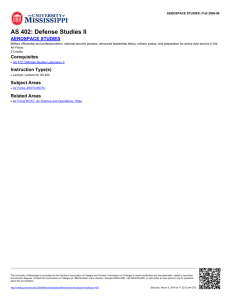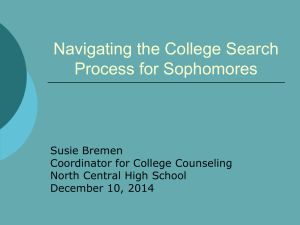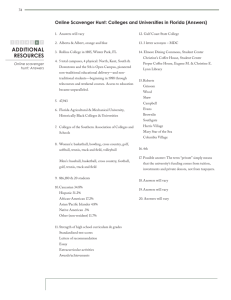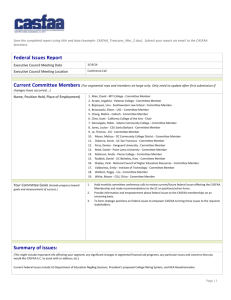National Trends with Transfer Students
advertisement
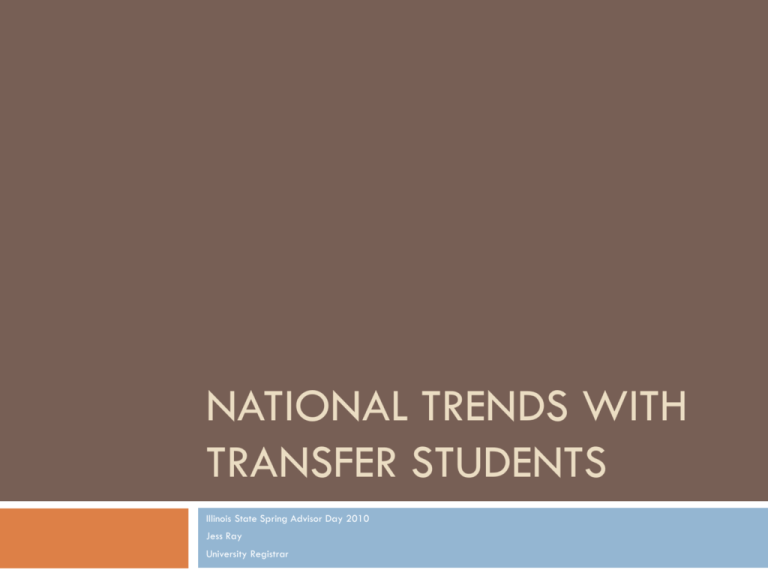
NATIONAL TRENDS WITH TRANSFER STUDENTS Illinois State Spring Advisor Day 2010 Jess Ray University Registrar Association for the Study of Transfer Students Chartered on July 16, 2009 Grew out of the National Institute for the Study of Transfer Students Conference held at University of North Texas Association for the Study of Transfer Students Dedicated to promoting transfer student success, advancing transfer research, and facilitating partner ships to enhance transfer More info & a good section on transfer news can be found at http://transferinstitute.unt.edu Transfer & the Reauthorization of Higher Education Act Diploma Mills – An official definition is now in place as part of the Act. The Dept. of Education will provide to the public information on its website on how to know what is a diploma mill and how to avoid them. It also continue to work with other agencies on stopping diploma mills. Transfer & the Reauthorization of Higher Education Act Dual Enrollment. The act will allow higher education institutions on July 1, 2010 to admit as regular students individuals that are dually or concurrently enrolled in the institution and a secondary school. My take – Trying to encourage more dual enrollment and acceptance of transfer credit. Transfer & the Reauthorization of Higher Education Act We are required under the act to disclose publicly our transfer policies especially our criteria on determining the transfer of credit earned at another institution. We are required to provide the information on the web and give the information link to the Department of Education Transfer & the Reauthorization of Higher Education Act We are not required to change our policies, practices or procedures on the transfer of credit. We are not required to accept transfer credit. Office of the University Registrar is working on our compliance requirements. State Response to Transfer A trend is continuing of states trying to enhance transfer through legislative mandate or programs. Here are some current examples. It was announced this January that Oregon has established a common criteria for general education courses. http://www.oregonlive.com/education/index.ssf/2010 /01/state_boards_smooth_paths_for.html State Response to Transfer Here are some current examples. Tennessee is looking at expanding the mission of community colleges to cut costs and increase graduation rates by working on how the public 2 year and 4 year schools work together. http://www.tennessean.com/article/20091229/NEWS 02/912290352/TN+legislators+want+to+expand+mi ssion+of+community+colleges State Response to Transfer Kentucky is working on a statewide system of standard courses, requirements and transcripts to help transfer from 2 year to 4 year schools. http://cpe.ky.gov/policies/academicinit/Transfer/ State Response to Transfer California Transfer Crisis. The budget crisis has shown problems with its transfer pipeline, services and processes. Estimated that 1,300 community college students expecting to transfer to San Jose would need to make different plans. http://chronicle.com/article/At-Transfer-TimeThousands/48678/ State Response to Transfer Response to the Crisis California is considering four-year degrees at community colleges. http://www.nctimes.com/news/local/sdcounty/article_ 70eef4fc-f933-5dba-8a9f-2890db1b62a1.html Recession impacts Transfer Community Colleges have seen an increase in enrollments especially for full time students In December it was reported that nationally the head count is up 11.4 over last year and 16.9 over two years. Some community colleges have been offering midnight courses to address the boom and to make full use of classroom space. http://www.insidehighered.com/news/2009/12/18/e nroll On the Horizon AACRAO Transfer Conference – Feb. 14-16, 2010 One of the Featured Topics will be – The End of Educational Privacy: Surveillance in the Name of Transfer by Barmak Nassirian It is about the creation and expansion of State Longitudinal Data Systems and privacy concerns and the tracking of transfer students


